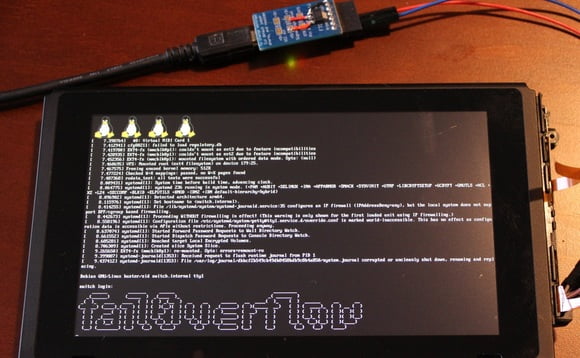The bug can’t be squashed due to the boot ROM hardcoded onto Nvidia’s chip
HACKERS HAVE CRACKED into the Nintendo Switch and figured out how to get the hybrid console to run Linux.
According to hacker group fail0verflow, who posted a photo of the Switch running Linux on Twitter, the hack was made possible due to a “bootrom” flaw.
???? #switch pic.twitter.com/4iTjTk9D59
— fail0verflow (@fail0verflow) February 6, 2018
While fail0verflow didn’t reveal exactly how it cracked the console, it would it would appear it’s exploiting a bug on the boot ROM of Nvidia’s off-the-shelf Tegra X1 SoC which powers the Switch.
The boot ROM contains the code and the instructions for the Switch when it’s switched on, and by inserting code into this process, the Switch can be made to run Linux.
And because the boot ROM is essentially hard-coded into the Tegra X1 chip when its made, fail0verflow claim it can’t be plugged and that no patch from Nintendo will mitigate the flaw.
The flaw can also be exploited without the need for custom modifications or chips which has often been the case with such ‘jailbreaking’ of games consoles.
Nintendo could strike a deal with Nvidia for it to manufacture Tegra X1 chips for new Switches that don’t contain a boot ROM with a security hole, but we’ll have to wait and see if that happens.
If fail0verflow released how it fully exploited the bug then we could see hobbiest hackers get Linux up and running on their Switches and create a homebrew community around the hybrid console.
Given the Switch currently has some high acclaimed games such as Mario Odyssey and The Legend of Zelda: Breath of the Wild, you’d be forgiven for asking why anyone would replace Nintendo’s elegant, if minimal interface for Linux.
But as is the case with such hacks, they simply exist and are done because the can be. And they also open up the Switch for software piracy, which unsurprisingly games publishers and Nintendo take a very dim view of.
Nintendo has a staunch anti-emulation policy even for its games that are decades old and arguably almost lost to time, so we can’t imagine the Japanese gaming firm is going to be happy with flaw in its super successful console.


